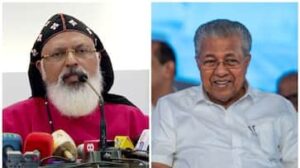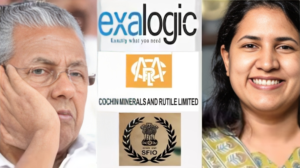CPM, CPI talks to break Lokayukta logjam remain inconclusive
[ad_1]
The bilateral talks between the CPM and the CPI over the proposed Kerala Lokayukta (Amendment) Ordinance have remained inconclusive. The two major partners in Kerala’s ruling Left Democratic Front (LDF) government resorted to talks after the CPI refused to agree with the proposed amendment which had triggered a huge political controversy. The CPI is the second largest ally of the CPM-led LDF.
Top leaders of both the parties took part in the discussions held at AKG Centre, the CPM’s headquarters, on Sunday. Chief Minister politburo member A Vijayaraghavan and Law Minister P Rajeev attended the meet from the CPM while state secretary Kanam Rajendran and senior leader Panniyan Raveendran represented the CPI.
Earlier, Rajendran said the CPI had already made it clear that it was opposed to the amendment. The party proposed some alternatives at the bilateral talks the details of which have not been revealed yet.
Sources said the CPI has proposed that a situation wherein the powers will be concentrated in the chief minister, the governor and the chief secretary should be avoided. The talks will continue.
Several ordinances, including the Kerala Lokayukta (Amendment) Ordinance, issued by the LDF government lapsed on August 8 as Governor Arif Mohammad Khan had not signed them.
Recently at a Cabinet meeting, CPI ministers K Rajan and P Prasad had expressed their strong disapproval of the proposed Lokayukta (Amendment) Ordinance, 2022.
The CPI ministers told the Cabinet that they were disinclined to pass the Bill in its proposed form. It was also stated that it would be politically untenable for the Left to dilute the Lokayukta’s powers.
Top sources said Chief Minister Pinarayi Vijayan did not brush aside the opposition of the CPI ministers. Instead, he said legal complications would arise if the Bill was not passed in the form it was in the Ordinance.
If the Bill comes into force in the proposed form, the last word on a Lokayukta verdict will rest with the “competent authority”, mostly the Chief Minister.
As it stands, the Lok Ayukta or an Upa-Lokayukta orders, arrived at after investigation into complaints, are binding on the government. “The competent authority” (the governor or the chief minister or the government as the case may be) shall accept the declaration”, the Kerala Lokayukta Act, 1999, says.
“When the declaration so made is accepted, the fact of such acceptance shall immediately be intimidated by registered post, by the governor, the Government or the chief minister, if any of them is the competent authority,” the Lokayukta Act furher states.
The Ordinance had bestowed power on the “competent authority” to either accept or reject the Lokayukta order after conducting a final hearing. The “competent authority”, however, will have to take a decision within three months or the Lok Ayukta verdict will be deemed as accepted.
The main concern was that the anti-corruption body, created to check corruption in the government, would be emasculated. Take for instance, the Lokayukta verdict on former minister K T Jaleel. Lokayukta had found that Jaleel had abused his position as minister to appoint a relative as the general manager of Kerala State Minorities Development Corporation.
Jaleel refused to accept the verdict and he approached the Supreme Court. The apex court refused to stay the Lokayukta order and Jaleel had no choice but to resign. But if the Jaleel episode had happened when the amendment was in place, the chief minister, being the “competent authority” in a minister’s case, could have held a final hearing and could probably rule in favour of Jaleel.
The CPI wants the “competent authority”, contained in section 14 of the proposed Bill, to be replaced with a high-level committee with members holding independent views, including a representative of the government. In other words, the CPI does not want the chief minister to sit in judgment over the allegations of corruption and misuse of power by ministers.
[ad_2]
Source link








